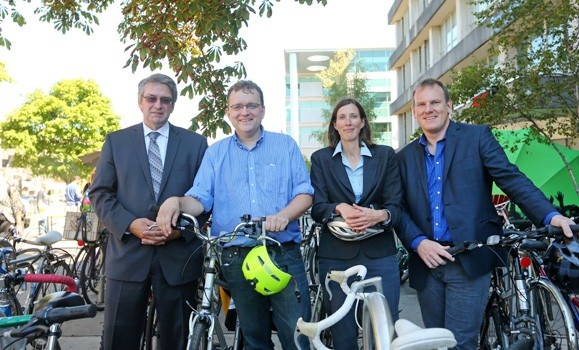By all counts, cycling is big at Dalhousie.
More than 10 per cent of Dal students, faculty and staff consider their bicycle their primary form of transportation to school or work, compared to only 1 per cent of Canadians generally. There are more than 900 bike parking spaces across Dal’s four campuses, with 250 added in the last two years. From the advocacy and support role of the Dal Bike Centre, to the student-led initiative to install bike repair stations across campus and around Halifax, there’s plenty happening at Dal in support of those who find their way on two wheels.
Now, Dal’s cycling leadership is poised to go up another gear.
Last Friday, the Nova Scotia Department of Energy announced an investment of $150,000 to support a proposed cycle track pilot project along University Avenue — the first of its kind in Nova Scotia.
The proposed cycle track would be a separated bike lane, installed along the north and south sides of University Avenue, stretching from Robie Street to LeMarchant Street. The track would be separated from the remaining traffic by a wide painted buffer and a physical barrier.
Increasing rider safety and confidence
This sort of urban cycle track— partitioned from car traffic — is popular in cities around the world, but there’s none of the sort in Nova Scotia yet. Dal’s would be the first, provided the pilot project is approved by Halifax Council later this month. The pilot cycle track, aligns with Dal’s active transportation goals for University Avenue — as outlined in the Campus Master Plan — as well as the 2012 Bikeways Plan agreed upon between Dal and its partners in the Institutional District (Saint Mary’s, Capital Health and the IWK Health Centre).
The separated bikeways aim to promote cycling on campus and in the community while also encouraging an increase in ridership, with the divided lanes increasing rider safety and confidence.
“It’s our hope that the province’s announcement of funding today will help Dalhousie move ahead with this project, so that Dalhousie can meet the objectives of its Campus Master Plan and the Institutional Cycling Plan,” said Andrew Younger, Minister of Energy, announcing the funding support at an event Friday in the LeMarchant Place atrium.
“We are confident that once complete the project will serve as a pilot project for other Nova Scotian communities and here in Halifax as well,” he added.
“We’re hoping it will include existing cyclists and new cyclists as well,” said Ian Nason, vice-president finance and administration at Dal. “Folks of all ages and abilities will be able to use this in an enhanced and safe environment along University Avenue.”
Project pending HRM approval
Before any construction can begin, Halifax Council must first approve the project; Council is currently scheduled to review Dal’s proposal at next week’s meeting. Councillor Waye Mason did speak at last Friday’s event, expressing his support for the initiative.
The proposed bike lanes would impact parking along University Avenue, with some HRM meters and spaces being removed. Plans are to move some accessible parking spaces and parking meters to adjacent streets.
Full details of the project, including construction timeline, will be finalized following Halifax Council approval.
To learn more about cycling at Dalhousie, check out the following:

